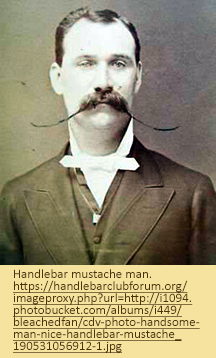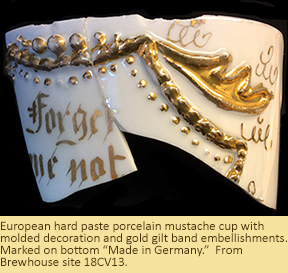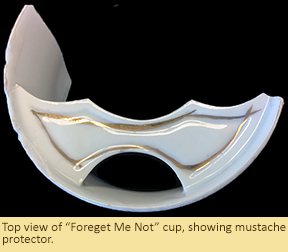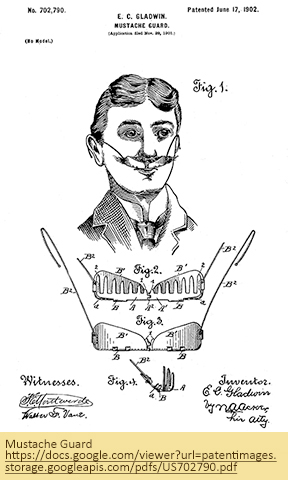Curator's Choice 2017
Forget Me Not Mustache Cup
October 2017
By Patricia Samford, MAC Lab Director
 During the second half of the nineteenth century, it was fashionable for men to sport long, flowing mustaches. This mustachioed look commenced after the British colonization of India. Whether the British troops wished to emulate their Indian counterparts, or because facial hair helped them maintain control in this new colony, mustaches became normal attire for the British military man. Between the years 1860 and 1916, the King’s Regulations and Orders for the Army even went so far as to stipulate that mustaches be sported by troops.
During the second half of the nineteenth century, it was fashionable for men to sport long, flowing mustaches. This mustachioed look commenced after the British colonization of India. Whether the British troops wished to emulate their Indian counterparts, or because facial hair helped them maintain control in this new colony, mustaches became normal attire for the British military man. Between the years 1860 and 1916, the King’s Regulations and Orders for the Army even went so far as to stipulate that mustaches be sported by troops.
 These mustaches were tamed into shape using a stiff wax made from ingredients like tallow, beeswax, pine resin and saturated vegetable oil, allowing for artistic sculpting of facial hair. While giving a mustache a groomed appearance, the wax had the unfortunate tendency to melt when it came into contact with hot beverages. Not only were careful grooming efforts destroyed, but the melted wax would lend a noxious taste to a cup of hot tea or coffee.
These mustaches were tamed into shape using a stiff wax made from ingredients like tallow, beeswax, pine resin and saturated vegetable oil, allowing for artistic sculpting of facial hair. While giving a mustache a groomed appearance, the wax had the unfortunate tendency to melt when it came into contact with hot beverages. Not only were careful grooming efforts destroyed, but the melted wax would lend a noxious taste to a cup of hot tea or coffee.
 In order to solve this problem, Staffordshire potter Harvey Adams came up with an ingenious invention sometime between 1850 and 1860—a new style of cup that incorporated a small interior ledge that shielded the mustache from the steamy liquid inside. A less popular option was a mustache guard patented in 1902 by E. C. Gladwin, designed to protect the mustache from food, especially soup and hot liquids. Gladwin’s patent stated that the guards could be manufactured in different colors and fabrics, presumably to coordinate with clothing.
In order to solve this problem, Staffordshire potter Harvey Adams came up with an ingenious invention sometime between 1850 and 1860—a new style of cup that incorporated a small interior ledge that shielded the mustache from the steamy liquid inside. A less popular option was a mustache guard patented in 1902 by E. C. Gladwin, designed to protect the mustache from food, especially soup and hot liquids. Gladwin’s patent stated that the guards could be manufactured in different colors and fabrics, presumably to coordinate with clothing.

This elaborately molded and gilded porcelain cup bears the sentiment “Forget Me Not” and was almost certainly given as a gift. A printed mark on the cup base shows that it was manufactured in Germany, although mustache cups were also made in England, the United States and Japan. Archaeologists at the MAC Lab believe this cup was owned by John Broome Mackall, who lived at the Brewhouse plantation in St. Leonard Maryland. Mr. Mackall was there at the time of his death in 1913 and this cup was found as a part of a large group of dishes discarded after he died. The placement of the cup handle to the right of the ledge tells us that Mr. Mackall was most likely right-handed.
Mustache cups remained popular until the beginning of World War I, when military regulations requiring clean-shaven faces caused large mustaches to go out of fashion. Handlebar mustaches made it impossible to create a good seal on gas masks used to protect soldiers against mustard gas. It is interesting to discover that British political and military actions were responsible for both the rise and the fall of the handlebar mustache in British and American culture.